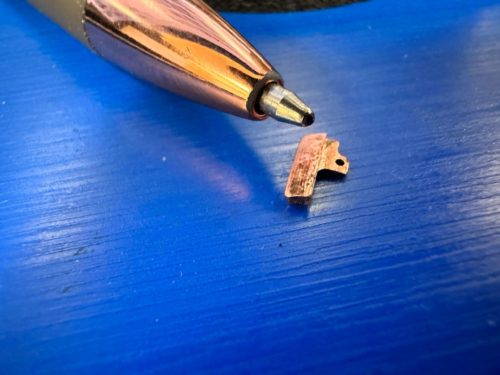Complexities of Small Part Precision Machining
Looking for a precision machining partner who specializes in tiny parts? You might be wondering, how small is small?
Here at KAD, we’re experts at machining micro parts. We’ve tackled projects with parts smaller than a grain of rice—some even smaller than half of a grain! These contacts pictured above measure .027” X.118” X.236″:
Micro parts are often found within small products and gadgets. Recently, we’ve made:
- Metal contacts that go inside the charge port on cell phones and wearable tech
- Fasteners and standoffs
- Watch components
If you’re designing tiny parts, you’ll want to work with an experienced manufacturer who can get the job done right the first time.
4 Signs a Precision Machine Shop Is Equipped to Machine Small Parts
Ideally, the precision machine shop you select to manufacture your small parts should check these four boxes:
1. They have small tools (and excellent eyesight!)
Small tooling is necessary to achieve intricate details on small workpieces. At KAD, the tiniest tool we carry in stock measures 0.003”. For reference, that’s the diameter of a piece of human hair!
Setting tools that small is exceptionally challenging, so a shop should have sufficient technologies in place, like our non-contact laser tool setting system, which helps prevent the tools from becoming damaged.
One unexpected but critical factor: a manufacturer has to be able to actually see the tooling while they are manipulating it! So they’ll need excellent eyesight—or at least supportive eyewear.
2. They use rapid spindle speeds
Manufacturers use very high spindle speeds to make tiny parts quickly, turning the tools fast enough to remove material at a rate that keeps costs reasonable.
We calculate the surface footage (a unit of velocity) to determine the appropriate speed for machining small parts. The formula takes the diameter of the tool and multiplies it by the revolutions per minute (RPM), then divides that number by the flutes.
If you need turned parts, Swiss turning centers can get the job done. But for milled parts, only a 5-axis or multi-axis machine can get the job done right, and at KAD, we have both. We use mills with spindle speeds of 15,000 RPM and higher—some as high as 60,000-80,000 RPM!
3. They can perform intricate finishing operations
Small parts may require intricate finishing operations. For example, when deburring a micro part, the manufacturer must be skilled enough to hold it steady and perform the operation without breaking it. Even a tiny nick from a sharp blade can throw a part out of tolerance.
To mitigate risk, we recommend designing micro parts so they can come off the machine complete to eliminate secondary processes altogether.
Sometimes, the solution is to choose a material that doesn’t require finishing. We recently worked with a client who requested a small part made from a magnetic material that wouldn’t rust. Rather than machining a material that would need nickel plating (which would require a secondary operation), we suggested they use magnetic stainless steel.
If finishing treatments are non-negotiable, look for a precision machining partner who can adequately perform processes like plating on highly delicate parts.
4. They expertly pack and ship small parts
The right manufacturer will know how to package and ship small parts appropriately. We once had a client who threw their micro parts away, thinking they were part of the packaging! We now ship micro parts in large, padded, clearly labeled containers.
Choose an Experienced Shop for Small Part Precision Machining
Vetting your manufacturing supplier is an absolute must when you need small parts. Ideally, you want to work with an experienced precision machine shop that has successfully made small parts before and can rise to the challenge again.
A shop that has never made small parts will likely run into many problems (e.g., broken tooling, broken parts) that could cost you precious time and money. Talk to your shop and find out their experience and capabilities before requesting a quote for a micro part.
If you want to start immediately with a team of experts who can make your small parts to spec and get them to you in perfect condition, let’s work together! Please submit an RFQ, and we’ll be in touch shortly.



